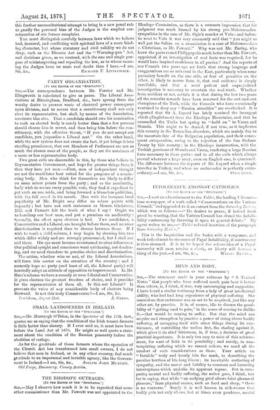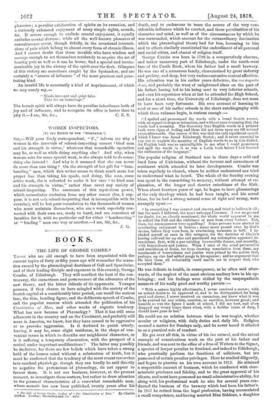MINI) AND BODY.
[TO THE EDITOR OF THE usrscrkron.-]
Stn,—The statement made in your columns by "A Trained Nurse" that people who have suffered much pain bear it better than others, is, I think, if true, very encouraging and suggestive. I have heard a similar testimony from a lady of great intellectual ability, who had had long experience of physical suffering. She assured me that endurance was an art to be acquired, just like any other art, by practice. it is, of course, idle to discuss the possi- bility of "getting used to pain," in the sense of ceasing to dislike it,—that would be ceasing to suffer. But that the mind can acquire and strengthen by practice a power of rising above bodily suffering, of occupying itself with other things during its con- tinuance, of controlling the useless fret, the chafing against it, which gives it its chief bitterness, is, if true, a doctrine of great practical importance. It is only too easy to miss of this achieve- ment, for want of faith in its possibility ; and surely, in con- templating suffering which we cannot relieve, we need all the comfort of such considerations as these. Your article on "Invalids" truly and keenly hits the mark, in describing the peculiar burthen of life-long illness ; its inevitable outlasting of sympathy, and the unrest and liability to constant and harassing interruptions which underlie its apparent repose. But in com- paring mental and bodily suffering, the writer goes, I think, too far in saying, that while "an undying grief allows faint gleams of pleasure," from physical causes, such as food and sleep, "there is no converse." Surely it is well known in sick-rooms that bodily pain not only allows, but at times even produces, mental pleasures ; a peculiar exhilaration of spirits on its cessation, and a curiously enhanced enjoyment of many simple sights, sounds, &c. If severe enough to exclude mental enjoyment, it equally excludes mental distress ; while all the well-known pleasures of convalescence occur, though fitfully, in the occasional intermis- sions of pain which belong to almost every form of chronic illness. And I cannot doubt that those invalids who have wisdom and courage enough to set themselves resolutely to acquire the art of bearing pain as well as it can be borne, find a special and incom- municable joy in the victory of the spirit over the flesh. Glimpses of this victory are sometimes caught by the bystanders, and are certainly a "source of influence" of the most precious and pene- trating kind.
An invalid life is necessarily a kind of imprisonment, of which we may surely say,—
" Minds innocent and quiet take That for an hermitage."
The hermit spirit will always have its peculiar inheritance both of joy and of influence, and to recognise its office is better than to































 Previous page
Previous page